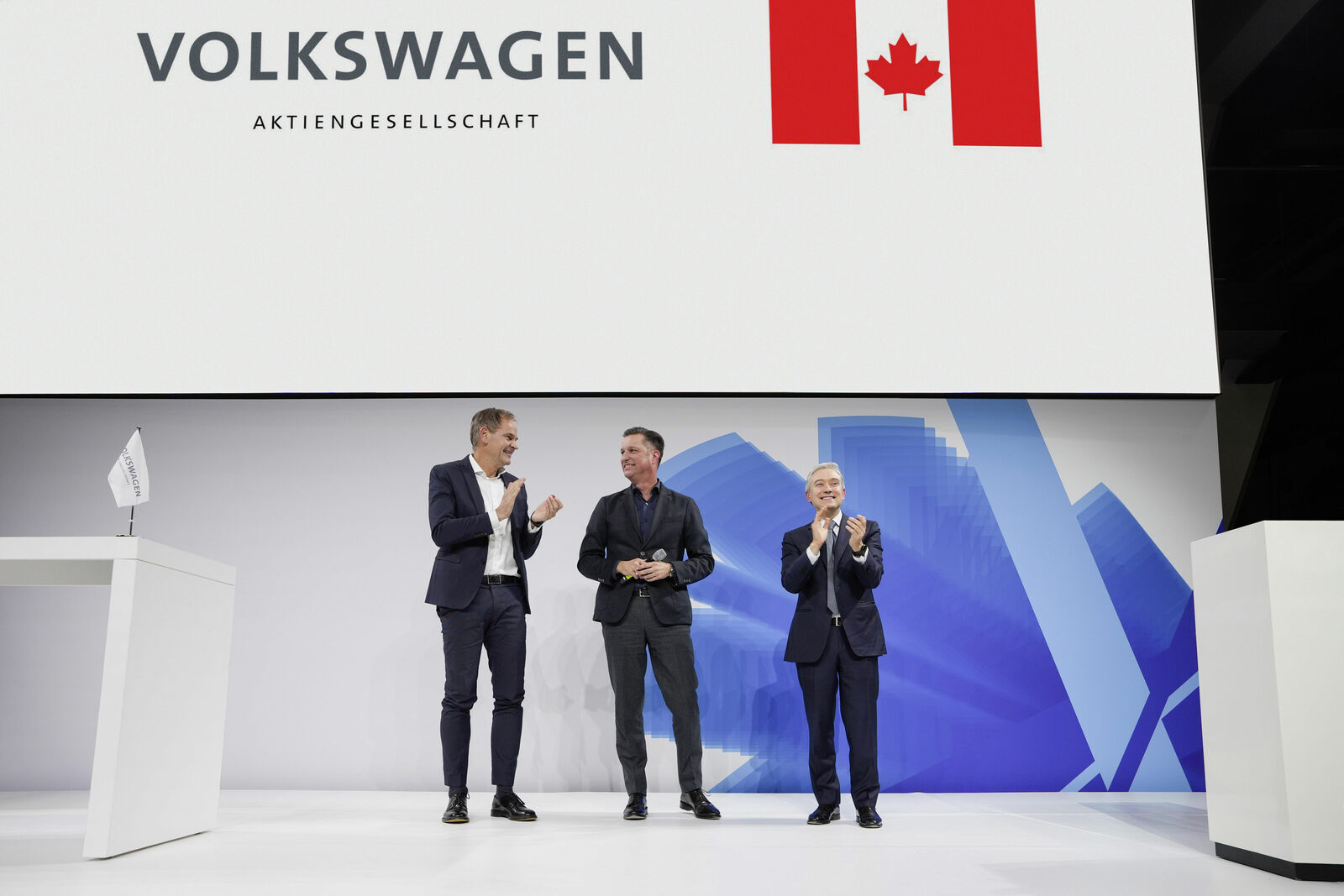Oliver Blume, CEO Volkswagen Group: “Our North American strategy is a key priority in our 10-point-plan that we’ve laid out last year. With the decisions for cell production in Canada and a Scout site in South Carolina we’re fast-forwarding the execution of our North American strategy.”
Thomas Schmall, Board Member for Technology of Volkswagen AG and Chairman of the Supervisory Board of PowerCo SE: “Our gigafactory in Canada sends a strong message: PowerCo is on track to become a global battery player. With the expansion to North America, we will enter a key market for e-mobility and battery cell production, driving forward our global battery strategy at full speed. Canada and Ontario are perfect partners for scaling up our battery business and green economy jobs, as we share the same values of sustainability, responsibility and cooperation. We are committed to be a reliable partner and good neighbor for the people in St. Thomas and Ontario.“
The Honourable François-Philippe Champagne, Canada’s Minister of Innovation, Science and Industry: “Today’s announcement by Volkswagen is a true testament to our highly skilled workforce and Canada’s strong and growing battery ecosystem. VW’s decision to establish its first overseas gigafactory in Canada speaks to our country’s competitiveness when it comes to attracting major investments. It is also a vote of confidence in Canada as the green supplier of choice to the world. With Volkswagen and PowerCo, our government looks forward to working together towards a cleaner, more sustainable and resilient economy.“
Ideal conditions for PowerCo's first battery plant outside Europe
The PowerCo decision to locate its next plant in St. Thomas in Ontario / Canada is a further milestone in the global roll-out of its battery strategy. After Salzgitter and Valencia, this will be the third Group-owned plant worldwide and PowerCo’s first cell factory in North America. It will equip the Group brand’s BEVs in the region with cutting-edge battery cells ‒ and is part of a larger plan that Volkswagen and PowerCo agreed upon with Canadian Prime Minister Justin Trudeau's government in August last year. The Memorandum of Understanding signed back then focusses on battery value creation and raw material security in order to promote e-mobility in the country.
While PowerCo is to become a key player in the development of the battery value stream in North America, Canada offers ideal conditions, including the local supply of raw materials and wide access to clean electricity. More details on gigafactory St. Thomas will be revealed in the near future.
Growth strategy for North America
Arno Antlitz, CFO & COO Volkswagen Group: “We now have the unique opportunity to grow profitably in North America and play a key role in driving the transition to electric mobility there. Both new, major projects are integral building blocks of our ambitious growth program for the entire region. We will be able to address an even broader range of customers. Volkswagen has the right strategy, products and scale to take a strong position in the North American market.“
The Volkswagen Group is driving forward the introduction of the broadest portfolio of full-electric vehicles in the United States. Group brands plan to introduce more than 25 new BEV models through 2030. In addition, the Group plans to fully leverage the region's power by creating more synergies and making even better use of the innovative strength, technical expertise, production capacities, supply chains and market knowledge of all brands in Canada, the United States, and Mexico.
Volkswagen will therefore continue to bring more manufacturing capabilities and know-how to the region. In addition to its ramped-up assembly of the all-electric ID.4 compact SUV in Chattanooga, Tennessee, Volkswagen also has plans to upgrade the plants in Puebla and Silao, Mexico, for the assembly of BEVs and potentially for BEV components such as electric motors in the second half of the decade.
Entering the highly attractive truck and rugged SUV segments with the all-electric Scout
With the electrification of the iconic Scout brand the Group will enter the highly attractive truck and rugged SUVs segments. Scout vehicles are being designed and developed from the ground up on a new all-electric platform that emphasizes off-road capability. Scout Motors is backed by the Volkswagen Group and operates as an independent unit within the Group.
South Carolina is an established leader in the U.S. automotive industry with over 500 automotive-related companies and 75,000 automotive industry employees. The state is No. 1 in the U.S. for export sales of both completed passenger vehicles and tires. More than 200,000 Scout vehicles are expected to roll off the Columbia, South Carolina production line each year. Production is scheduled to begin by the end of 2026.
Further NAR activities by CARIAD and Electrify America
To bring the U.S.-specific digital customer experience to the next level and leverage the U.S.’s leading position in technology and software innovation, Volkswagen's software and technology company CARIAD has established a technology hub in the U.S. at the beginning of 2023. Specifically, the team of over 200 software engineers and developers based in the greater Seattle area and Silicon Valley is working on Volkswagen’s Automotive Cloud that will connect the next generations of vehicles from all Group brands like Volkswagen, Audi and Porsche as well as next-generation software in the automated driving and digital experience space. CARIAD is also becoming part of the U.S. digital ecosystem, partnering with tech players from the U.S. like Microsoft for backend and cloud technologies or Qualcomm for high-performance hardware to increase its speed of innovation and development.
Volkswagen Group is also driving the expansion of Electrify America, with a coast-to-coast charging network in the U.S. and Canada with 800 stations/3,500 DC fast chargers powered by 100% renewable energy with a "Boost Plan" to more than doubling this number by 2026.
Further reactions and comments:
The Honourable Vic Fedeli, Ontario’s Minister of Economic Development, Job Creation and Trade: “This historic investment by Volkswagen and PowerCo SE is a massive vote of confidence in our plan to build and will strengthen our made-in-Ontario electric vehicle supply chain to create more good-paying jobs for workers in St. Thomas and across the province. Whether it’s investing in clean steel or unlocking the economic potential of our critical minerals, our government is on a mission to create the right conditions for businesses and workers to succeed as we build the economy of the future. Thank you, Volkswagen, for choosing Ontario.“
Frank Blome, CEO PowerCo SE: “PowerCo is all set to introduce key strategic assets such as the unified cell and the standardized cell factory to Canada and the larger North American market. We are dedicated to build up regional and therefore robust, transparent and sustainable supply chains.”
Pablo Di Si, President and CEO of Volkswagen Group of America, Inc.: “Electric mobility is our opportunity for growth in the North American Region, and we’re pushing ahead with an ambitious strategy to take a leading position. Over the next few years, we will bring many more all-electric models to customers and communities. Strengthening our industrial base and supply chains in North America is key to making this happen. PowerCo’s investment in Canada will underpin that strategy by meeting our needs for a stable supply of electric vehicle batteries.”








